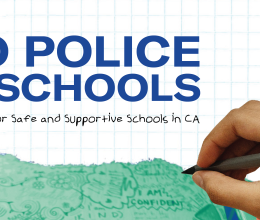
On October 13, 2017, Governor Brown signed AB 1360 into law. The new law took effect on January 1, 2018 and makes clear what charter school operators must do to ensure equal admissions access and disciplinary due process for all students.
Ensuring Fair Charter School Admissions
A charter school shall admit all students who wish to attend the charter school. If there are not enough spaces, the charter school must hold a random, public lottery.
Can charter schools have admissions preferences?
Yes, but only in very limited circumstances.
Any preferences must:
☑ Be approved by the chartering authority at a public hearing.
☑ Be in compliance with both federal and state law, including civil rights and anti-discrimination laws.
☑ Not discriminate, including by limiting enrollment access for:
→ Students with disabilities
→ Academically low-achieving pupils
→ English learners
→ Neglected or delinquent pupils
→ Homeless pupils
→ Pupils who are economically disadvantaged (determined by eligibility for any free or reduced- price meal program)
→ Foster youth, or
→ Pupils based on nationality, race, ethnicity, or sexual orientation.
☑ Not require mandatory parent volunteer hours or donations as a criterion for admission or continued enrollment. A charter school may encourage parental involvement, but shall notify parents and guardians of applicant and currently enrolled students that parental involvement is not a requirement for acceptance or continued enrollment.
Key questions:
| Examples of impermissible policies:
|
Ensuring Due Process in Charter School Discipline
What are a student’s rights if they face potential suspension or removal?
A charter school’s policies for suspensions, expulsions, or other involuntary removals, must comply with federal and state constitutional requirements and the procedures below:
For suspensions of fewer than 10 days, the charter school must provide:
☑ Oral or written notice of the charges.
If the student denies the charges
☑ An explanation of the evidence that supports the charges.
☑ An opportunity for the pupil to present their side of the story.
For suspensions of 10 days or more and all other disciplinary expulsions, the charter school must provide:
☑ Timely, written notice of the charges and an explanation of the student’s basic rights, and
☑ A hearing judged by a neutral officer, where the student has a fair opportunity to: present testimony, evidence, and witnesses; confront and cross-examine adverse witnesses; and bring legal counsel or an advocate.
For any involuntary removal from a charter:
☑ The parent or guardian must receive written notice of intent to remove the pupil no less than 5 school days before the effective date.
The written notice shall:
☑ Be in the native language of the pupil or the pupil’s parent/guardian
☑ Shall inform him or her of the right to a hearing
☑ HIGHLIGHT: If the hearing procedure is initiated, the pupil shall remain enrolled and shall notbe removed until the charter school issues a final decision.
What must the charter school and school district do after a student leaves a charter school?
If a student is expelled or leaves the charter school without graduating or completing the school year for any reason, the charter school shall:
☑ Notify the superintendent of the school district of the student’s last known address within 30 days, and
☑ Upon request, provide that school district with a copy of the cumulative record of the pupil, including report cards or a transcript of grades, and health information.
If the pupil re-enrolls in their previous school district and is subsequently expelled from or leaves the school district without graduating or completing the school year for any reason, the school district shall:
☑ Provide this information to the charter school within 30 days if the charter school demonstrates that the pupil had been enrolled in the charter school.
What can a student do if they think that a charter school has violated AB 1360?
Students and parents have the right to file a complaint for violations of AB 1360 using Uniform Complaint Procedures.
→ For expulsions, “timely, written notice” is 10 days before the expulsion hearing.
→ For other disciplinary actions, “timely, written notice” is sufficient time for the student/family to gather evidence and respond.
→ “Involuntary removals” include disenrollments, dismissals, transfers, or terminations, but do not include suspensions.









